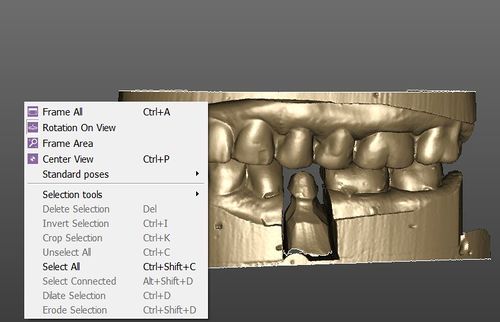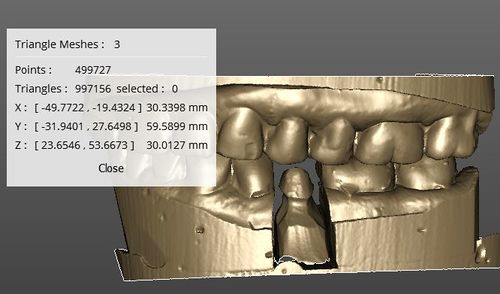Difference between revisions of "Interaction"
(Marked this version for translation) |
|||
| Line 39: | Line 39: | ||
In the software options, it's possible to enable an "Alternative Interaction" mode which allows to swap the ''middle mouse button'' and the ''right mouse button'', in order to set an interaction more similar to other CAD software. | In the software options, it's possible to enable an "Alternative Interaction" mode which allows to swap the ''middle mouse button'' and the ''right mouse button'', in order to set an interaction more similar to other CAD software. | ||
| + | <!--T:39--> | ||
In case the user has a 3D Mouse, the interaction depends on the specific 3D Mouse commands. | In case the user has a 3D Mouse, the interaction depends on the specific 3D Mouse commands. | ||
| − | ===Touchscreen monitor Interaction=== | + | ===Touchscreen monitor Interaction=== <!--T:40--> |
| + | <!--T:41--> | ||
To interact with the software using a touchscreen monitor: | To interact with the software using a touchscreen monitor: | ||
| + | <!--T:42--> | ||
* Touch the image with two fingers to zoom in or out; | * Touch the image with two fingers to zoom in or out; | ||
* Touch the image with three fingers to rotate the view. | * Touch the image with three fingers to rotate the view. | ||
Latest revision as of 08:50, 11 October 2017
Contents
Main View
Here below is displayed an example of 3D interaction on a selected Mesh in OpticalRevEngDental.
It is possible to interact with the 3D View using the mouse and the keyboard, the context menu, the view menu and the view toolbar.
Mouse Interaction
The user can interact with the orientation of the 3D object through either the use of the mouse or more specific tools that can be selected in the View menu, the View toolbar or the Context menu.
Here below, find a list of the provided mouse/keyboard combinations:
-
 +
+  or
or  +
+  : pan the camera in 2D
: pan the camera in 2D -
 : freely rotate the camera around the 3D Object
: freely rotate the camera around the 3D Object -
 +
+  : rotate the camera restricted to the Y axis of the 3D View
: rotate the camera restricted to the Y axis of the 3D View -
 +
+  : rotate the camera restricted to the X axis of the 3D View
: rotate the camera restricted to the X axis of the 3D View -
 +
+  : rotate the camera restricted to the Z axis of the 3D View
: rotate the camera restricted to the Z axis of the 3D View -
 : change Zoom
: change Zoom -
 : enter the context menu
: enter the context menu -
 +
+  : change the position of the light source in the 3D View
: change the position of the light source in the 3D View -
 : use the current tool (E.g. Rectangular Selection, Hole Filling, etc.)
: use the current tool (E.g. Rectangular Selection, Hole Filling, etc.) -
 +
+  : invert the current tool if available (E.g. Deselect points instead of Select points, etc.)
: invert the current tool if available (E.g. Deselect points instead of Select points, etc.) -
 + Number from 1 to 7 : change the 3D View to one of the default positions (E.g. Frontal, Back, Top, etc.)
+ Number from 1 to 7 : change the 3D View to one of the default positions (E.g. Frontal, Back, Top, etc.)
In the software options, it's possible to enable an "Alternative Interaction" mode which allows to swap the middle mouse button and the right mouse button, in order to set an interaction more similar to other CAD software.
In case the user has a 3D Mouse, the interaction depends on the specific 3D Mouse commands.
Touchscreen monitor Interaction
To interact with the software using a touchscreen monitor:
- Touch the image with two fingers to zoom in or out;
- Touch the image with three fingers to rotate the view.
Context Menu and View Menu
The view menu and the 3D View context menu contain some tools that can be used to interact with the 3D View.
- Frame All (
 + A) : the 3D camera will move to show, on the screen, all the current selected 3D Objects
+ A) : the 3D camera will move to show, on the screen, all the current selected 3D Objects - Rotation On View : if this option is enabled, the rotation will ignore the current selected 3D Objects; if it is disabled, the center of the rotation will be the baricenter of the selected 3D Objects
- Area Frame Tool: this tool allows to draw with
 a rectangle. The rectangle will become the new camera view.
a rectangle. The rectangle will become the new camera view. - Center View (
 + P) : the currently selected 3D Objects are moved at the center of the screen without changing their Zoom
+ P) : the currently selected 3D Objects are moved at the center of the screen without changing their Zoom - Standard Poses : sub-menu to apply default 3D views:
The context menu contains other tools described in the Data Editing page.
Data Information Window
In the view menu, it is possible to enable the Data Information Window with the View Data Window (![]() +
+ ![]() + I) action.
+ I) action.
This window provides some information about the current selected 3D Objects.
- Description: a line that describes the type of the currently selected objects (E.g. Triangle Mesh: 2, Range Images: 6, etc.)
- Points: the number of points of the currently selected objects
- Faces: the number of faces, available only for triangle meshes
- Selected: the number of selected points/faces of the currently selected objects
- Size and Position: the minimum/maximum coordinates of the volume of the currently selected objects, and their size in every direction




